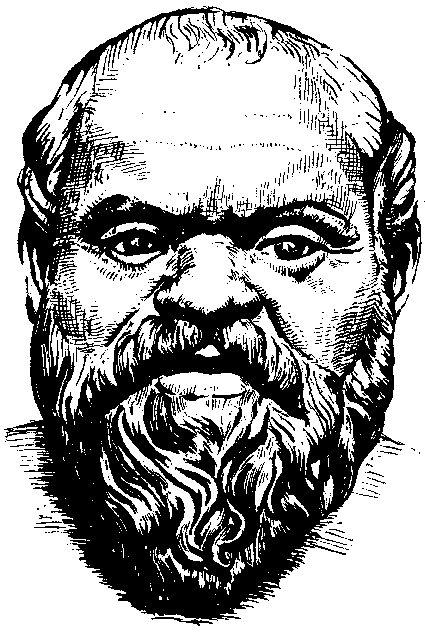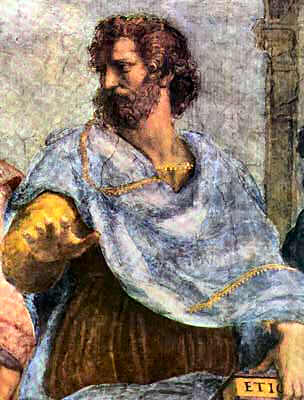Triumvirate
The word triumvirate refers to the three (3) greatest founding fathers of philosophy, i.e., Socrates, Plato and Aristotle. Ancient Greek Philosophy reached its height at the hands of these erudite philosophers. Henceforth, philosophy has been profoundly indebted, even acclaimed by some as merely a footnote, to their tenents.
Socrates

In his use of critical reasoning, by his unwavering commitment to truth, and through the vivid example of his own life, fifth-century Athenian Socrates set the standard for all subsequent Western philosophy. Since he left no literary legacy of his own, we are dependent upon contemporary writers like Aristophanes and Xenophon for our information about his life and work. As a pupil of Archelaus during his youth, Socrates showed a great deal of interest in the scientific theories of Anaxagoras, but he later abandoned inquiries into the physical world for a dedicated investigation of the development of moral character. Having served with some distinction as a soldier at Delium and Amphipolis during the Peloponnesian War, Socrates dabbled in the political turmoil that consumed Athens after the War, then retired from active life to work as a stonemason and to raise his children with his wife, Xanthippe. After inheriting a modest fortune from his father, the sculptor Sophroniscus, Socrates used his marginal financial independence as an opportunity to give full-time attention to inventing the practice of philosophical dialogue.
For the rest of his life, Socrates devoted himself to free-wheeling discussion with the aristocratic young citizens of Athens, insistently questioning their unwarranted confidence in the truth of popular opinions, even though he often offered them no clear alternative teaching. Unlike the professional Sophists of the time, Socrates pointedly declined to accept payment for his work with students, but despite (or, perhaps, because) of this lofty disdain for material success, many of them were fanatically loyal to him. Their parents, however, were often displeased with his influence on their offspring, and his earlier association with opponents of the democratic regime had already made him a controversial political figure. Although the amnesty of 405 forestalled direct prosecution for his political activities, an Athenian jury found other charges—corrupting the youth and interfering with the religion of the city—upon which to convict Socrates, and they sentenced him to death in 399 B.C.E. Accepting this outcome with remarkable grace, Socrates drank hemlock and died in the company of his friends and disciples.
Our best sources of information about Socrates's philosophical views are the early dialogues of his student Plato, who attempted there to provide a faithful picture of the methods and teachings of the master. (Although Socrates also appears as a character in the later dialogues of Plato, these writings more often express philosophical positions Plato himself developed long after Socrates's death.) In the Socratic dialogues, his extended conversations with students, statesmen, and friends invariably aim at understanding and achieving virtue {Gk. areth [aretê]} through the careful application of a dialectical method that employs critical inquiry to undermine the plausibility of widely-held doctrines. Destroying the illusion that we already comprehend the world perfectly and honestly accepting the fact of our own ignorance, Socrates believed, are vital steps toward our acquisition of genuine knowledge, by discovering universal definitions of the key concepts governing human life.
Interacting with an arrogantly confident young man in Euqufrwn (Euthyphro), for example, Socrates systematically refutes the superficial notion of piety (moral rectitude) as doing whatever is pleasing to the gods. Efforts to define morality by reference to any external authority, he argued, inevitably founder in a significant logical dilemma about the origin of the good. Plato's Apologhma (Apology) is an account of Socrates's (unsuccessful) speech in his own defense before the Athenian jury; it includes a detailed description of the motives and goals of philosophical activity as he practiced it, together with a passionate declaration of its value for life. The Kritwn (Crito) reports that during Socrates's imprisonment he responded to friendly efforts to secure his escape by seriously debating whether or not it would be right for him to do so. He concludes to the contrary that an individual citizen—even when the victim of unjust treatment—can never be justified in refusing to obey the laws of the state.
The Socrates of the Menwn (Meno) tries to determine whether or not virtue can be taught, and this naturally leads to a careful investigation of the nature of virtue itself. Although his direct answer is that virtue is unteachable, Socrates does propose the doctrine of recollection to explain why we nevertheless are in possession of significant knowledge about such matters. Most remarkably, Socrates argues here that knowledge and virtue are so closely related that no human agent ever knowingly does evil: we all invariably do what we believe to be best. Improper conduct, then, can only be a product of our ignorance rather than a symptom of weakness of the will {Gk. akrasia [akrásia]}. The same view is also defended in the PrwtagoraV (Protagoras), along with the belief that all of the virtues must be cultivated together. Download
Plato

Plato is one of the world’s best known and most widely read and studied philosophers. He was the student of Socrates and the teacher of Aristotle, and he wrote in the middle of the fourth century B.C.E. in ancient Greece. Though influenced primarily by Socrates, to the extent that Socrates is usually the main character in many of Plato’s writings, he was also influenced by Heraclitus, Parmenides, and the Pythagoreans.
There are varying degrees of controversy over which of Plato’s works are authentic, and in what order they were written, due to their antiquity and the manner of their preservation through time. Nonetheless, his earliest works are generally regarded as the most reliable of the ancient sources on Socrates, and the character Socrates that we know through these writings is considered to be one of the greatest of the ancient philosophers.
Plato’s middle to later works, including his most famous work, the Republic, are generally regarded as providing Plato’s own philosophy, where the main character in effect speaks for Plato himself. These works blend ethics, political philosophy, moral psychology, epistemology, and metaphysics into an interconnected and systematic philosophy. It is most of all from Plato that we get the theory of Forms, according to which the world we know through the senses is only an imitation of the pure, eternal, and unchanging world of the Forms. Plato’s works also contain the origins of the familiar complaint that the arts work by inflaming the passions, and are mere illusions. We also are introduced to the ideal of “Platonic love:” Plato saw love as motivated by a longing for the highest Form of beauty—The Beautiful Itself, and love as the motivational power through which the highest of achievements are possible. Because they tended to distract us into accepting less than our highest potentials, however, Plato mistrusted and generally advised against physical expressions of love. Download
Aristotle

Aristotle is a towering figure in ancient Greek philosophy, making contributions to logic, metaphysics, mathematics, physics, biology, botany, ethics, politics, agriculture, medicine, dance and theatre. He was a student of Plato who in turn studied under Socrates. He was more empirically-minded than Plato or Socrates and is famous for rejecting Plato’s theory of forms.
As a prolific writer and polymath, Aristotle radically transformed most, if not all, areas of knowledge he touched. It is no wonder that Aquinas referred to him simply as “The Philosopher.” In his lifetime, Aristotle wrote as many as 200 treatises, of which only 31 survive. Unfortunately for us, these works are in the form of lecture notes and draft manuscripts never intended for general readership, so they do not demonstrate his reputed polished prose style which attracted many great followers, including the Roman Cicero. Aristotle was the first to classify areas of human knowledge into distinct disciplines such as mathematics, biology, and ethics. Some of these classifications are still used today.
As the father of the field of logic, he was the first to develop a formalized system for reasoning. Aristotle observed that the validity of any argument can be determined by its structure rather than its content. A classic example of a valid argument is his syllogism: All men are mortal; Socrates is a man; therefore, Socrates is mortal. Given the structure of this argument, as long as the premises are true, then the conclusion is also guaranteed to be true. Aristotle’s brand of logic dominated this area of thought until the rise of modern propositional logic and predicate logic 2000 years later.
Aristotle’s emphasis on good reasoning combined with his belief in the scientific method forms the backdrop for most of his work. For example, in his work in ethics and politics, Aristotle identifies the highest good with intellectual virtue; that is, a moral person is one who cultivates certain virtues based on reasoning. And in his work on psychology and the soul, Aristotle distinguishes sense perception from reason, which unifies and interprets the sense perceptions and is the source of all knowledge.
Aristotle famously rejected Plato’s theory of forms, which states that properties such as beauty are abstract universal entities that exist independent of the objects themselves. Instead, he argued that forms are intrinsic to the objects and cannot exist apart from them, and so must be studied in relation to them. However, in discussing art, Aristotle seems to reject this, and instead argues for idealized universal form which artists attempt to capture in their work.
Aristotle was the founder of the Lyceum, a school of learning based in Athens, Greece; and he was an inspiration for the Peripatetics, his followers from the Lyceum. Download